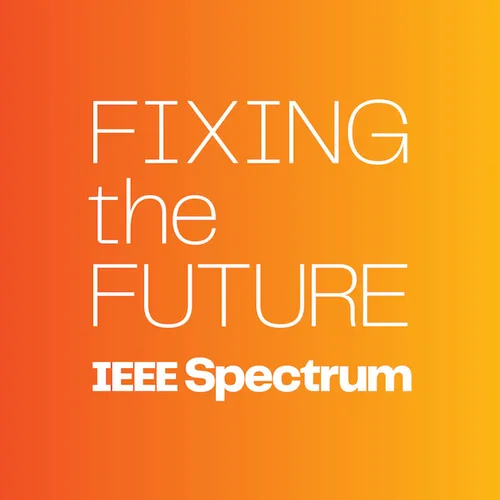
Fixing the Future
Fixing the Future from IEEE Spectrum magazine is a biweekly look at the cultural, business, and environmental consequences of technological solutions to hard problems like sustainability, climate change, and the ethics and scientific challenges posed by AI. IEEE Spectrum is the flagship magazine of IEEE, the world’s largest professional organization devoted to engineering and the applied sciences.
- Update frequency
- every 13 days
- Average duration
- 25 minutes
- Episodes
- 65
- Years Active
- 2020 - 2024

Are Fossil Fuels Impoverishing Middle America?
I suppose it’s elitist and maybe even nationalistic of me but I was surprised to hear the phrase “resource curse,” which I associate with the developing world, used recently in a webinar in the conte…

Self-Walking Exoskeletons
In the world of prosthetics, we’re still at the stage where a person has to instruct the prosthetic to first do one thing, then another, then another. As University of Waterloo Ph.D. researcher Broko…

Can 5G Close the Digital Divide?
Has there been any technology more widely talked about and yet still less understood than 5G? Qualcomm’s Vice President of Engineering, Our guest, John Smee, holds dozens of patents in wireless techn…

A Theory of (Almost) Everything
If there’s one thing we can all agree on, it’s that the world is not only changing quickly, it’s changing at a faster rate than ever. Or does it just seem that way?
Surely we can all agree that the …

Is Cyberwar War?
At a conference of chief technology officers in 2016, General Michael Hayden, former head of, at different times, both the NSA and the CIA, told the audience, “Cyberwar isn’t exactly war, but it’s no…

Mathematics, Politics, and Justice Denied
In the 2020 elections for the North Carolina State House, Democrats received 49 percent of the votes but won only 42.5 percent of the seats. In three-quarters of the state-level elections, the winnin…

Reversing Climate Change by Pulling Carbon Out of the Air
Let’s face it. The United States, and, really, the entire world, has squandered much of the time that has elapsed since climate change first became a concern more than forty years ago.
Increasingly, s…

The Uneconomics of Coal, Fracking, and Developing ANWR
Many things have changed in 2020, and it’s an open question which are altered permanently and which are transitory. Work-from-home may be here to stay; as might the shift from movie theatres and cabl…

Bright X-Rays, AI, and Robotic Labs—A Roadmap for Better Batteries
Batteries have come a long way. What used to power flashlights and toys, Timex watches and Sony Walkmans, are now found in everything from phones and laptops to cars and planes.
Batteries all work th…

Data-Free Medicine
The saddest fact about the coronavirus pandemic is certainly the deaths it has already caused and the many more deaths to come before the world gets the virus under at least as much control as, say, …

5G Cellular Spectrum Auction—Can’t Tell the Players Without a Scorecard
The Federal Communications Commission's very first cellular spectrum allocation was a messy affair. The U.S. was divided up into 120 cellular markets, with two licenses each, and in some cases, hundr…

Polling Is Too Hard—for Humans
In 1936, after polling its readers, the Literary Digest famously predicted a landslide victory for Alf Landon. On 2 November 1948, based on widespread polling that all pointed in one direction, the C…

Can Detroit Catch Tesla?
If any cars are mobile phones with wheels, it’s electric cars. And just as the switch from landline phones to mobile phones was quick, and from computers to smartphones was even quicker, the shift fr…

Telemedicine Comes to the Operating Room
A modern hospital operating room often has someone you never see on television: a medical device company representative. The device might be a special saw or probe or other tool for the surgeon to us…

The Battle for Videogame Culture Isn’t Playstation vs Xbox
November is a big month for the millions of people who devote their time and money to computer games. Within a two-day period Sony will be releasing its fifth-generation Playstation, and its main com…

5G, Robotics, AVs, and the Eternal Problem of Latency
Engineers will tell you that for an orchestra to rehearse remotely, it would need at least 500 megabits per second to avoid throwing off the synchronicity of a concert performance. But that’s using h…

Are Electronic Media Any Good at Getting Out the Vote?
In Get Out the Vote, co-authors Donald Green and Alan Gerber argue that political consultants and campaign managers have underappreciated boots-on-the-ground canvassing in person and on the phone, in…

Going Carbon-Negative—Starting with Vodka
In 2014, two Google engineers, writing in the pages of IEEE Spectrum, noted that “if all power plants and industrial facilities switch over to zero-carbon energy sources right now, we’ll still be lef…

The Problem of Filter Bubbles Hasn’t Gone Away
In 2011, the former executive director of MoveOn gave a widely-viewed TED talk, “Beware Online Filter Bubbles“ that became a 2012 book and a startup. In all the talk of fake news these days, many of …

Fake News Is a Huge Problem, Unless It’s Not
Despite what you think, fake news is a tiny fraction of our news diet, according to Jennifer Allen, a Ph.D. student at the MIT Sloan School of Management and the MIT Initiative on the Digital Economy…